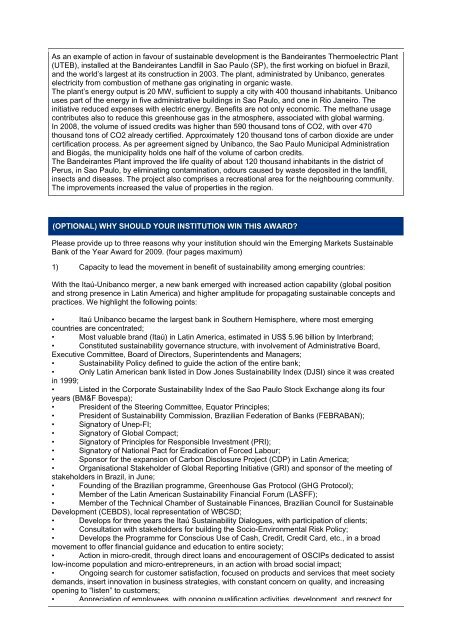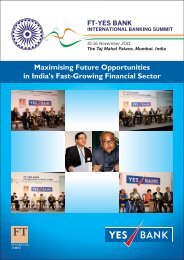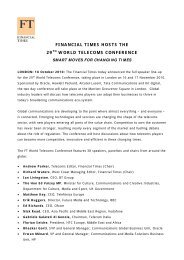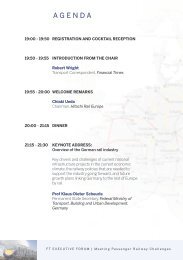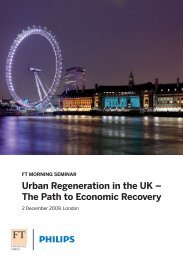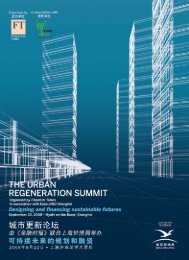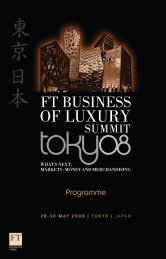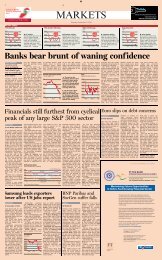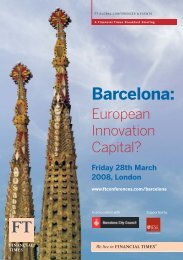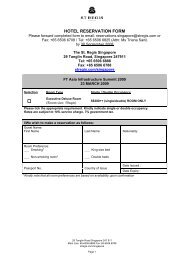FT SUSTAINABLE BANKING AWARDS 2009 Emerging Markets ...
FT SUSTAINABLE BANKING AWARDS 2009 Emerging Markets ...
FT SUSTAINABLE BANKING AWARDS 2009 Emerging Markets ...
You also want an ePaper? Increase the reach of your titles
YUMPU automatically turns print PDFs into web optimized ePapers that Google loves.
As an example of action in favour of sustainable development is the Bandeirantes Thermoelectric Plant<br />
(UTEB), installed at the Bandeirantes Landfill in Sao Paulo (SP), the first working on biofuel in Brazil,<br />
and the world’s largest at its construction in 2003. The plant, administrated by Unibanco, generates<br />
electricity from combustion of methane gas originating in organic waste.<br />
The plant’s energy output is 20 MW, sufficient to supply a city with 400 thousand inhabitants. Unibanco<br />
uses part of the energy in five administrative buildings in Sao Paulo, and one in Rio Janeiro. The<br />
initiative reduced expenses with electric energy. Benefits are not only economic. The methane usage<br />
contributes also to reduce this greenhouse gas in the atmosphere, associated with global warming.<br />
In 2008, the volume of issued credits was higher than 590 thousand tons of CO2, with over 470<br />
thousand tons of CO2 already certified. Approximately 120 thousand tons of carbon dioxide are under<br />
certification process. As per agreement signed by Unibanco, the Sao Paulo Municipal Administration<br />
and Biogás, the municipality holds one half of the volume of carbon credits.<br />
The Bandeirantes Plant improved the life quality of about 120 thousand inhabitants in the district of<br />
Perus, in Sao Paulo, by eliminating contamination, odours caused by waste deposited in the landfill,<br />
insects and diseases. The project also comprises a recreational area for the neighbouring community.<br />
The improvements increased the value of properties in the region.<br />
(OPTIONAL) WHY SHOULD YOUR INSTITUTION WIN THIS AWARD?<br />
Please provide up to three reasons why your institution should win the <strong>Emerging</strong> <strong>Markets</strong> Sustainable<br />
Bank of the Year Award for <strong>2009</strong>. (four pages maximum)<br />
1) Capacity to lead the movement in benefit of sustainability among emerging countries:<br />
With the Itaú-Unibanco merger, a new bank emerged with increased action capability (global position<br />
and strong presence in Latin America) and higher amplitude for propagating sustainable concepts and<br />
practices. We highlight the following points:<br />
• Itaú Unibanco became the largest bank in Southern Hemisphere, where most emerging<br />
countries are concentrated;<br />
• Most valuable brand (Itaú) in Latin America, estimated in US$ 5.96 billion by Interbrand;<br />
• Constituted sustainability governance structure, with involvement of Administrative Board,<br />
Executive Committee, Board of Directors, Superintendents and Managers;<br />
• Sustainability Policy defined to guide the action of the entire bank;<br />
• Only Latin American bank listed in Dow Jones Sustainability Index (DJSI) since it was created<br />
in 1999;<br />
• Listed in the Corporate Sustainability Index of the Sao Paulo Stock Exchange along its four<br />
years (BM&F Bovespa);<br />
• President of the Steering Committee, Equator Principles;<br />
• President of Sustainability Commission, Brazilian Federation of Banks (FEBRABAN);<br />
• Signatory of Unep-FI;<br />
• Signatory of Global Compact;<br />
• Signatory of Principles for Responsible Investment (PRI);<br />
• Signatory of National Pact for Eradication of Forced Labour;<br />
• Sponsor for the expansion of Carbon Disclosure Project (CDP) in Latin America;<br />
• Organisational Stakeholder of Global Reporting Initiative (GRI) and sponsor of the meeting of<br />
stakeholders in Brazil, in June;<br />
• Founding of the Brazilian programme, Greenhouse Gas Protocol (GHG Protocol);<br />
• Member of the Latin American Sustainability Financial Forum (LASFF);<br />
• Member of the Technical Chamber of Sustainable Finances, Brazilian Council for Sustainable<br />
Development (CEBDS), local representation of WBCSD;<br />
• Develops for three years the Itaú Sustainability Dialogues, with participation of clients;<br />
• Consultation with stakeholders for building the Socio-Environmental Risk Policy;<br />
• Develops the Programme for Conscious Use of Cash, Credit, Credit Card, etc., in a broad<br />
movement to offer financial guidance and education to entire society;<br />
• Action in micro-credit, through direct loans and encouragement of OSCIPs dedicated to assist<br />
low-income population and micro-entrepreneurs, in an action with broad social impact;<br />
• Ongoing search for customer satisfaction, focused on products and services that meet society<br />
demands, insert innovation in business strategies, with constant concern on quality, and increasing<br />
opening to “listen” to customers;<br />
• Appreciation of employees with ongoing qualification activities development and respect for


